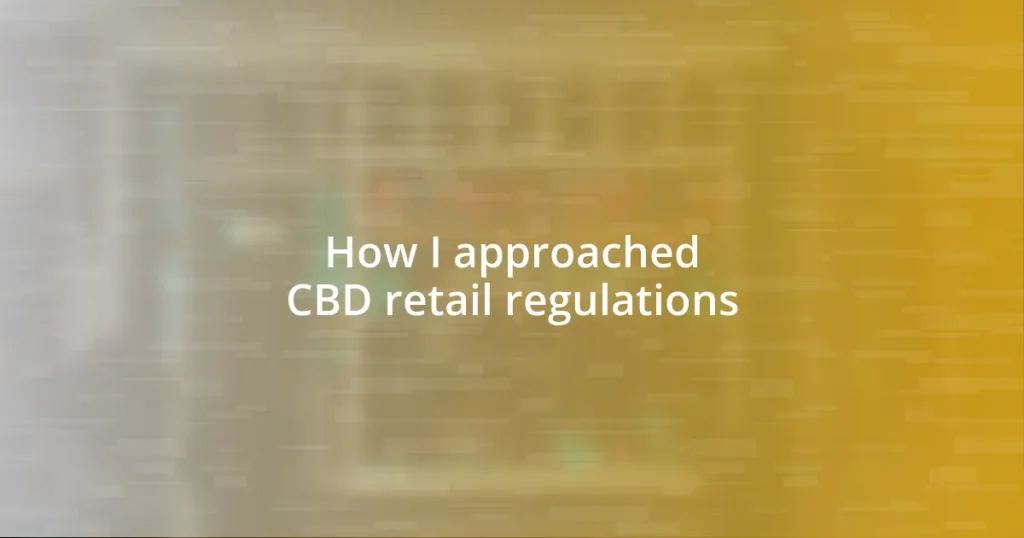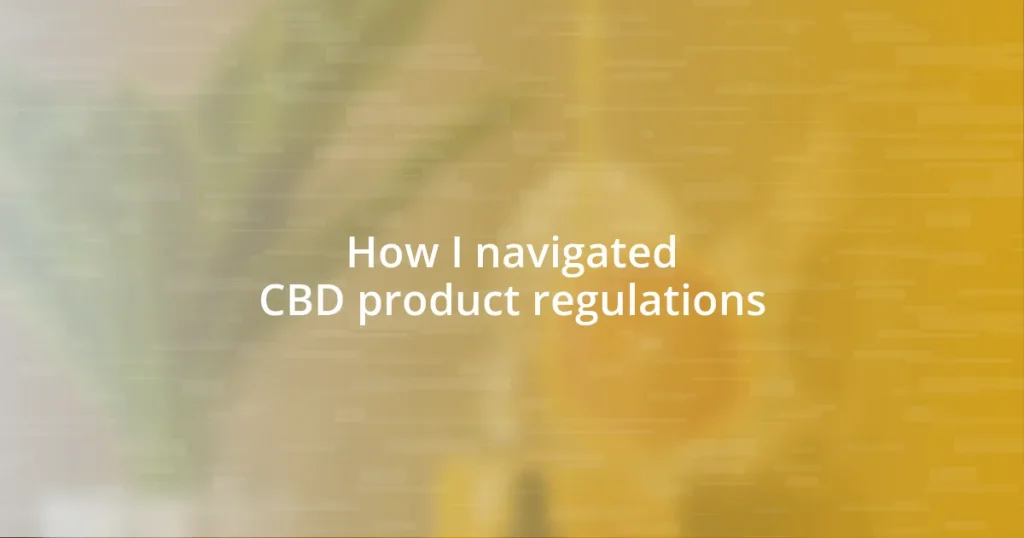Key takeaways:
- CBD retail regulations vary significantly by state, making it crucial for retailers to stay informed about both local and federal guidelines.
- Compliance with labeling, product testing, and marketing regulations is essential for building consumer trust and avoiding legal issues.
- Establishing relationships with compliance experts and providing staff training fosters a culture of accountability and thoroughness in regulatory matters.
- Future trends indicate a push for clearer federal regulations and the integration of technology to enhance product transparency and traceability.
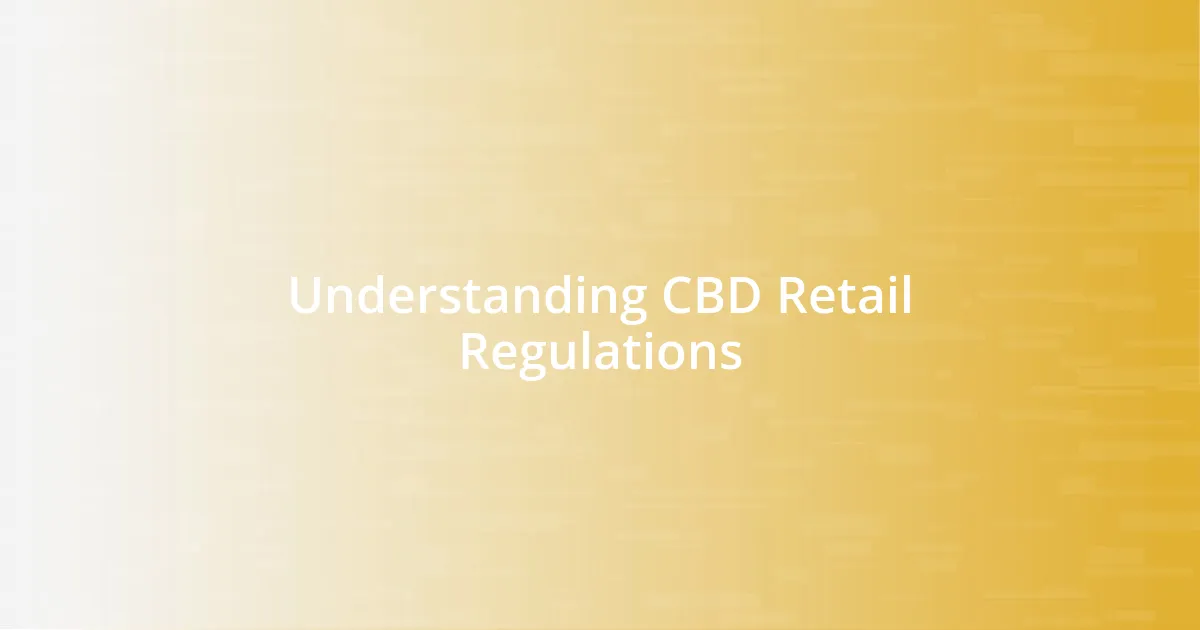
Understanding CBD Retail Regulations
Navigating CBD retail regulations can feel overwhelming, especially when you’re just starting out. I remember sitting at my desk, combing through endless compliance documents, feeling both frustrated and fascinated. How could something with so much potential also be wrapped in such a complicated web of laws?
One significant aspect to grasp is that regulations vary from state to state, and even within regions. During my first experience opening a CBD shop, I learned firsthand how particular trading laws could impact my product offerings. I was stunned to realize that what I could sell in one state could be completely off-limits just a few miles away. It’s essential to stay updated on both local and federal guidelines because changes can happen quickly and unexpectedly.
Another critical factor is labeling requirements. In my journey, I often found myself double-checking product labels to ensure they met FDA and local standards. There were moments when I felt a surge of pride, knowing I was contributing to consumer safety by providing clear and accurate information. But it also made me wonder—how many vendors cut corners just to push products out the door? Compliance ensures trust, and that’s something I believe every retailer should prioritize.

Key Legal Aspects to Consider
When approaching CBD retail, I learned that licenses and permits are non-negotiable. I recall feeling the weight of responsibility when I submitted my first application, nervous that a missing signature might derail my plans. Each state has its own licensing requirements, so I made it a priority to familiarize myself with not only my local regulations but also the nuances that could affect my business in neighboring states.
While navigating the legal landscape, I quickly recognized the importance of product testing and quality assurance. I still remember the relief I felt when I received the first batch of lab results for my products. Knowing that my CBD items were third-party tested for potency and contaminants gave me confidence in my brand. Unfortunately, I’ve also witnessed opportunities lost for those who overlooked this aspect—consumers today are savvy and expect transparency.
Lastly, I can’t stress enough the value of understanding marketing regulations. From my first social media campaign, I felt the push and pull of creative expression versus legal obligation. I once published a post that unintentionally ventured into unapproved health claims, which taught me to handle promotional content with care. Staying compliant in marketing is crucial, as missteps can lead to penalties and damage your brand’s reputation.
| Legal Aspect | Description |
|---|---|
| Licenses and Permits | Essential for operating legally; requirements vary by state. |
| Product Testing | Third-party testing for quality and potency builds consumer trust. |
| Marketing Regulations | Marketing claims must comply with state and federal guidelines to avoid penalties. |
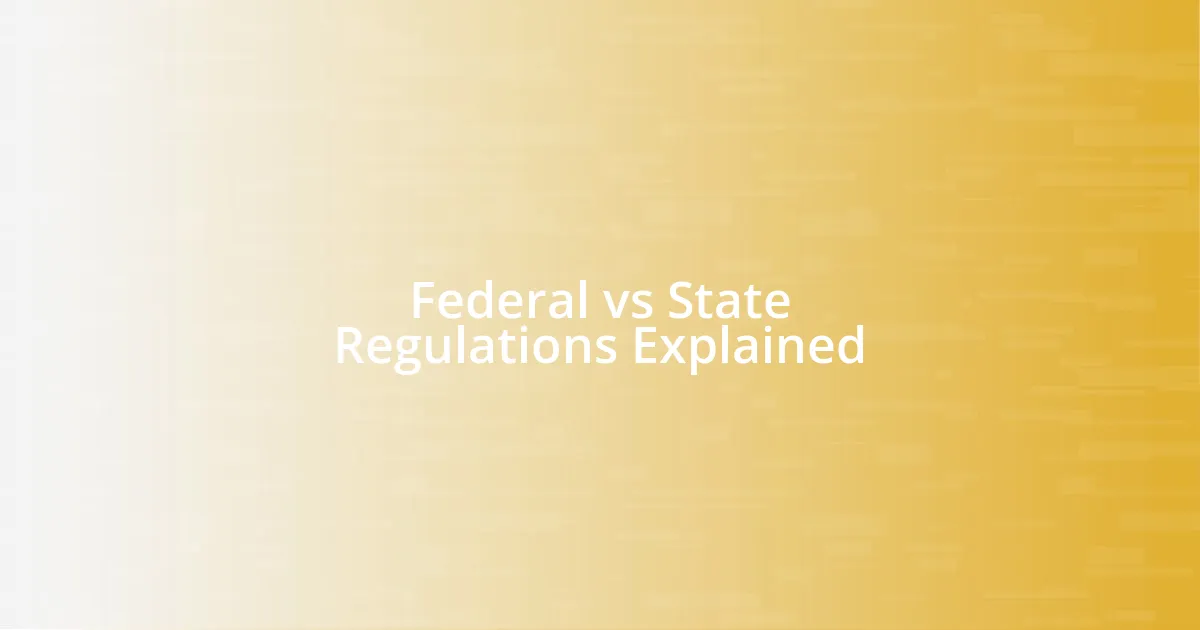
Federal vs State Regulations Explained
Understanding the divide between federal and state regulations is crucial for anyone in the CBD retail space. I learned this when I was knee-deep in regulations, realizing how federal law could seem all-encompassing—but states often carved out their own rules. It was a bit like playing a game where each player brought their own set of rules; you never knew when you’d hit a landmine if you weren’t paying attention.
- Federal regulations typically focus on safety and standardization, primarily through agencies like the FDA.
- States can impose stricter guidelines on the sale and distribution of CBD, meaning what’s legal in one place may not be in another.
- Tracking changes across both levels is essential for maintaining compliance and preventing costly missteps.
On a practical level, I remember how attending a state compliance seminar transformed my understanding. Listening to experts share real stories about their compliance battles struck me deeply. It dawned on me that operating within the federal framework might feel more straightforward—but if I didn’t respect state laws, I risked my entire business. Each interaction reminded me that awareness and diligence are my best allies in this complex industry. Taking the path of least resistance may be tempting, but as I learned, thoroughness pays off.

Compliance Strategies for Retailers
I’ve always approached compliance as a cornerstone of building my CBD retail business. Early on, I created a checklist for myself that included checking local regulations, obtaining the necessary licenses, and setting up a robust product testing protocol. I vividly remember one particularly tense afternoon where I double-checked everything, worried that missing a small detail could unravel my hard work. That attention to detail paid off; being proactive about compliance not only safeguarded my business but also set a professional tone with my suppliers and consumers alike.
Another strategy that worked wonders for me was establishing a relationship with a knowledgeable compliance consultant. The journey of navigating regulations can feel overwhelming, often leaving you with more questions than answers. I can’t tell you how many late-night brainstorming sessions I had where I wondered if I was missing critical updates. Having a go-to expert helped mitigate my fears and ensure I was always in the loop. It was a relief to know I had a partner who understood the complexities and nuances of the law, allowing me to focus on growing my business while feeling secure in my compliance framework.
Finally, regular training sessions for my staff were essential. I found that everyone needed to understand the regulations as much as I did. During one of our training days, I saw how a simple discussion about marketing discrepancies sparked questions from my team that I hadn’t even considered. It reinforced the idea that compliance is a collective effort. How often do we overlook the importance of educating those around us? Making compliance a team priority not only alleviated pressure on me but also cultivated a culture of accountability and transparency within my business.
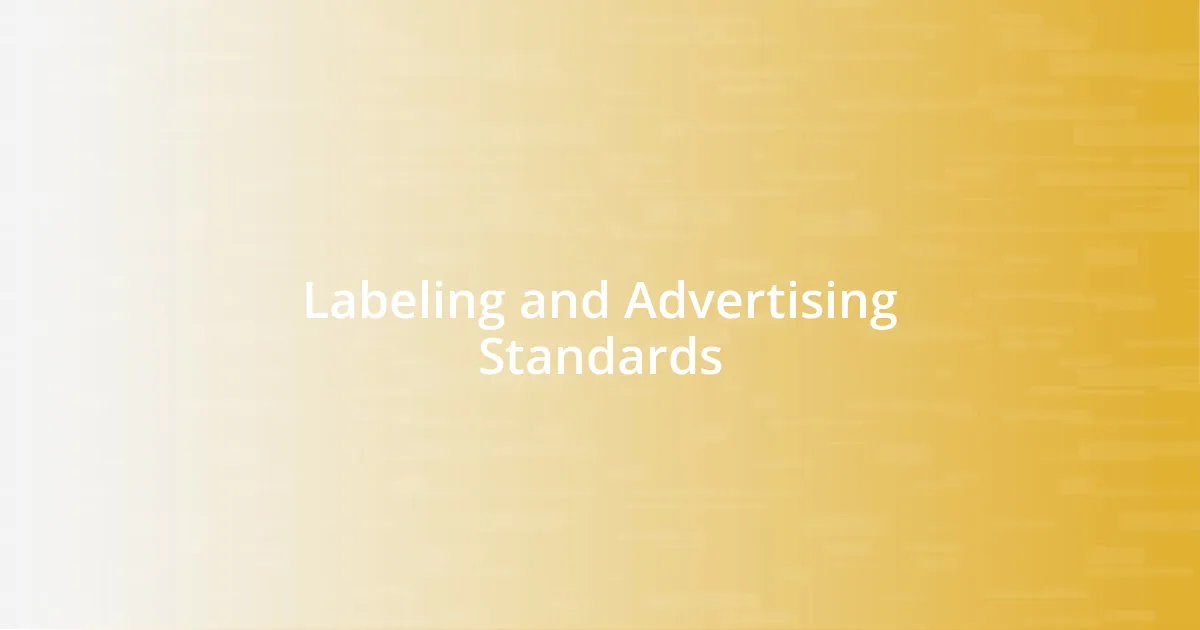
Labeling and Advertising Standards
Labeling and advertising standards in the CBD space can be tricky. I remember a moment when I first started working on product labels. It was unforgettable; I wanted them to be eye-catching yet compliant. While creating labels, I realized that clear, honest messaging was essential—not just to meet legal requirements, but to build trust with my customers. I often ask myself: what do consumers really want to know? The answer always circles back to transparency.
In my journey, the importance of accurate labeling hit home during a product recall situation. One of our brands had a formulation mix-up that could have devastated our reputation. Fortunately, our labels explicitly stated the ingredients and dosage, which helped to ease customer concerns. It reminded me that consumers appreciate simplicity and clarity. I learned that weaving essential information seamlessly into labels not only protects my business but also empowers my customers to make informed choices.
When it comes to advertising, the landscape feels like a minefield. Initially, I was excited to promote our products widely, but I quickly learned that playing it loose could lead to serious consequences. Reflecting on early marketing campaigns, I can’t help but cringe a bit at the thought of how bold claims might have crossed the line. Each misstep taught me how crucial it is to approach advertising with a clear understanding of the do’s and don’ts—like not claiming our products could cure diseases. Sometimes, I wonder: how can we effectively market CBD without overstepping legal boundaries? The answer lies in embracing a more educational approach, making my audience aware of the benefits while keeping our claims grounded in reality.
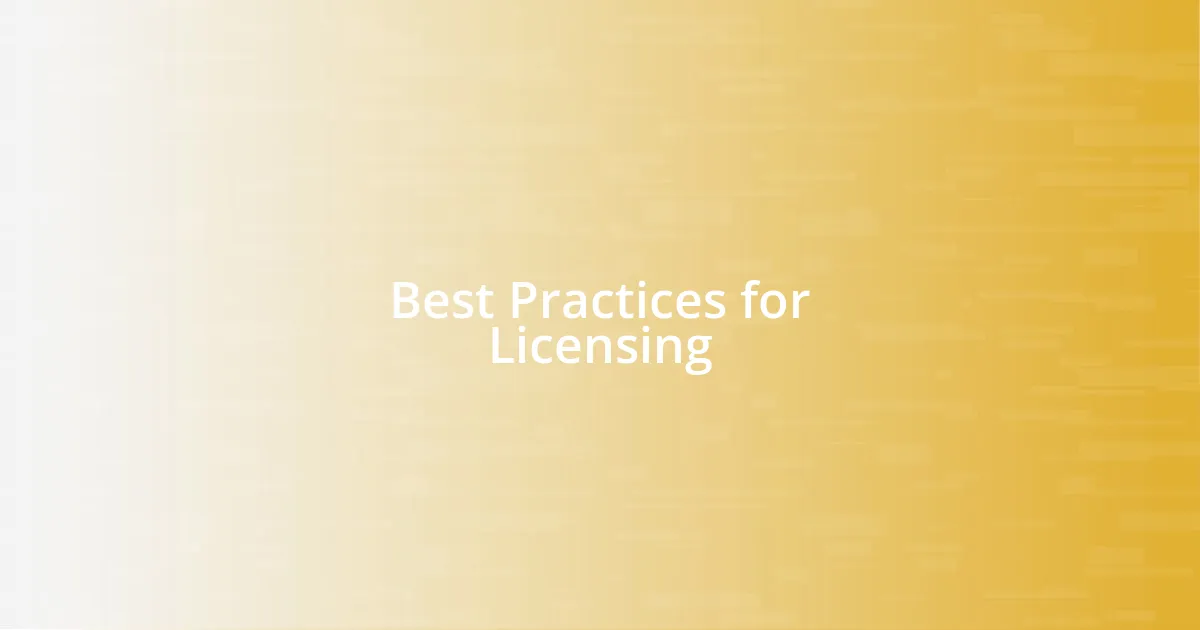
Best Practices for Licensing
Navigating the licensing landscape for CBD retail requires a careful approach. I remember the day I gathered all the documentation needed for my license application; it felt like a monumental task. To streamline this process, I recommend keeping a dedicated folder—both physical and digital—so you can easily reference your documents when it’s time to renew or update your licenses. It’s surprising how often I found myself needing a specific paper at the last minute, and having everything organized saved me a lot of panic.
One of the best practices I discovered was to create a timeline for the licensing process. Initially, I underestimated how long certain approvals could take. I learned the hard way that some licenses can be delayed due to unforeseen issues. By establishing a timeline, I could anticipate potential hurdles and give myself plenty of buffer time to address any unforeseen setbacks. Have you ever found yourself racing against deadlines? It’s an experience I wouldn’t wish on anyone, and planning proved to be my saving grace.
Lastly, I can’t stress enough the importance of networking within the industry as I pursued my licensing. Attending trade shows and local meet-ups connected me with other retailers who shared their experiences and insights. There was a particular workshop that changed my perspective; listening to others’ stories made me realize I wasn’t alone in this journey. How valuable is it to learn from others’ mistakes and successes? For me, it was invaluable, enriching my understanding of the licensing process and helping me build relationships that proved beneficial in the long run.
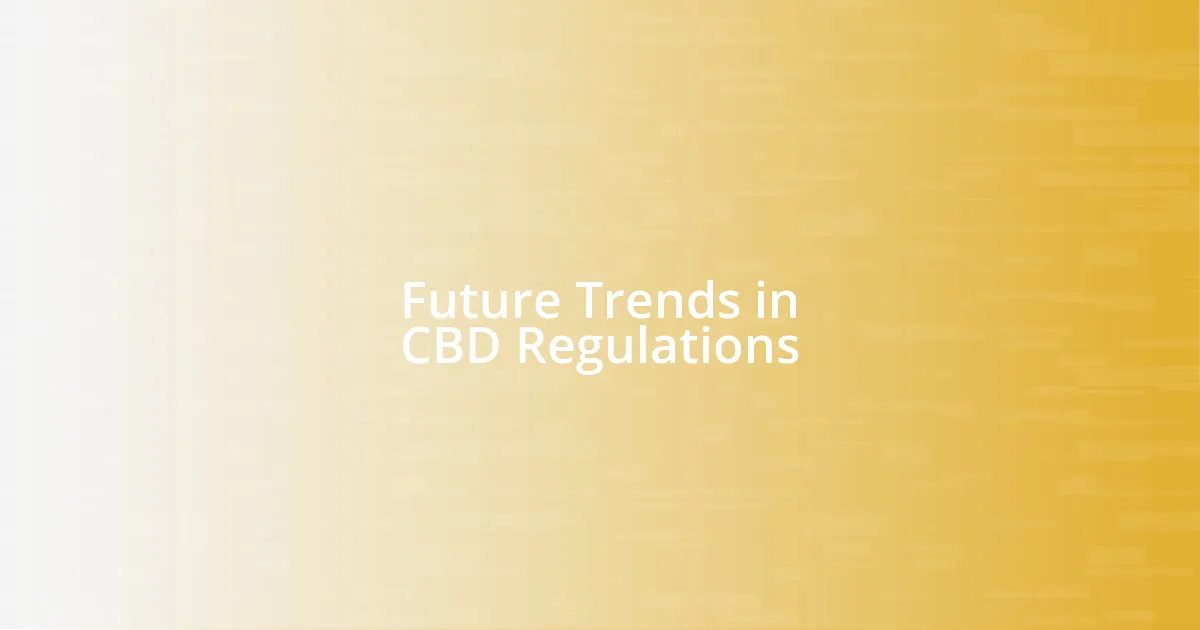
Future Trends in CBD Regulations
As I look ahead to the evolving landscape of CBD regulations, I can’t help but feel a mix of excitement and anxiety. There’s a palpable shift toward stricter compliance, especially regarding safety and quality standards. I remember attending a recent industry conference where a panel discussion on evolving regulations left me pondering: how will these changes impact my business strategy? I’ve come to understand that anticipating regulatory shifts is more than just a precaution; it’s an opportunity to strengthen customer trust by ensuring our products meet the highest standards.
Moreover, I see a growing trend toward clearer federal guidelines on CBD, which could ultimately simplify the regulatory maze. The thought of a unified framework resonates with me, as I’ve been part of countless discussions lamenting the patchwork of state regulations. I recall a late night spent sorting through differing state requirements, feeling lost in a sea of legal jargon. A uniform approach would not only streamline operations but also foster a safer environment for consumers. It raises the question: wouldn’t a consistent regulatory landscape empower more entrepreneurs to confidently enter the market?
Finally, I’m particularly interested in the role of technology in shaping future CBD regulations. The rise of blockchain technology for tracking product origins is one avenue that intrigues me. I find myself often reflecting on a time when a customer questioned the purity of a product; my inability to provide immediate verification was frustrating. Incorporating technology could enhance transparency, allowing consumers to trace the journey of their products. Imagine the confidence that could emerge from having such solid verification—wouldn’t that change the perception of the entire industry? As I navigate these uncharted waters, I realize that embracing innovation might just be the key to thriving amid regulatory change.










